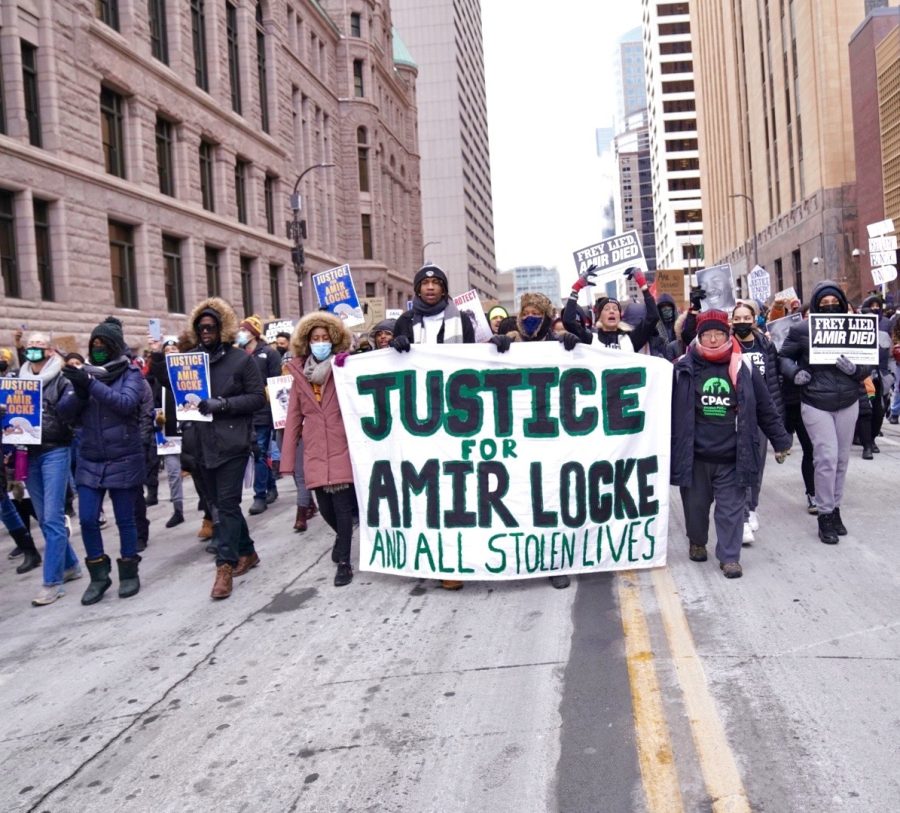The University of Minnesota’s Black Law Student Association (BLSA) wrote an open letter Feb 4. demanding the Minneapolis Police Department (MPD) fire the decision makers involved in approving the no-knock warrant that led to officer Mark Hanneman killing Amir Locke.
The open letter also demands the MPD release details of the warrant. Members of the group have called for wider police reform and a response from the University. MPD officer Mark Hanneman killed Locke, who had been sleeping on a couch with a gun in the morning of Feb. 2. Hanneman shot Locke within about nine seconds of entering the apartment while carrying out a no-knock search warrant that Locke was not named on, according to Minneapolis officials on Feb. 10.
Warrant documents were released Feb. 10, revealing that knock and no-knock warrants were received for three apartments at Bolero Flats in downtown Minneapolis. The officers carried out the warrants in search of a suspect in a St. Paul homicide case, who was arrested Feb. 7.
This incident follows the police killings of George Floyd in 2020, Daunte Wright in 2021 and Philando Castile in 2016. There have been protests around the city and activists have called for the abolition of no-knock warrants and the resignation of Minneapolis Mayor Jacob Frey.
BLSA leaders said they are calling upon the University’s Law School to use their power as one of the highest ranking law schools in Minnesota to take a stance on police brutality.
“The silence of the law school as an academic institution was deafening in response to Daunte Wright,” BLSA President Justice Shannon said. “When I realized that the law school [as an academic institution] was not going to comment on murders in their own backyard, I felt the need to speak up.”
The student group is about 50 years old and has about 25 members.
Some BLSA members said their shared experiences as law students and as people of color enable them to take collective action.
“We only know about a certain number of instances of murders or police brutality in the time we’ve been here, but there is much more undocumented,” BLSA member Akeem Anderson said. “These people who will become martyrs for state-sponsored violence are episodes of a larger issue.”
Police reformation is not an anti-police mechanism but about implementing systemic change and recognizing the racism historically rooted in policing, according to Shannon.
“American policing comes from South Carolina in the 1790s where groups of white men would police slaves and make sure there were no slave rebellions,” Shannon said.
BLSA members said they want the University and general law enforcement to reevaluate the function of police in cities and acknowledge the origins of American policing.
Shannon said every time there is an act of police brutality, regardless of severity, conversations around police reform should happen in public and on the ballot.
“I think every time there is an act of police brutality in Minneapolis or Minnesota, whether it’s to the Black community, a murder or physical abuse or assault, the discussion of police reform needs to be put back on the public’s mind and on the ballot,” Shannon said.
BLSA members said the University needs to provide additional emotional support and a more caring environment for University students impacted by this tragedy, including potentially canceling or postponing classes.
“It appears that these issues in Black and minority communities have not been on the forefront of the University to discuss,” BLSA member and University student Elizabeth Bovell said.
Although the Law School teaches critical race theory, Shannon said the course should be required for all students. Shannon also said the law school should do more to support police reform.
“The law school has the power and needs to take public stances to demand police reform because it will not come from the judiciary branch, but the legislative branch,” Shannon said.
Overall, BLSA said they do not want to focus on momentary acts of resistance, but instead implement structural changes to the ways people think and organize around police violence, while also supporting and taking care of mental health.
“We live in such a diverse area in Minneapolis and the school could make a better effort to show advocacy, whether it’s through the people who teach here, visitors or the deans that are hired,” Bovell said.


















